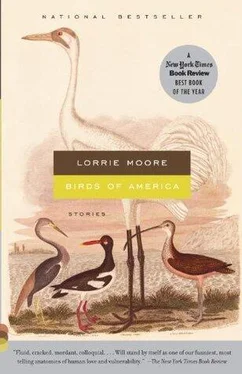Lorrie Moore
Birds of America
This book is for my sister and for my parents
and for Benjamin
… it is not news that we live in a world
Where beauty is unexplainable
And suddenly ruined
And has its own routines. We are often far
From home in a dark town, and our griefs
Are difficult to translate into a language
Understood by others.
CHARLIE SMITH, “The Meaning of Birds”
Is it o-ka-lee
Or con-ka-ree, is it really jug jug,
Is it cuckoo for that matter?—
Much less whether a bird’s call
Means anything in
Particular, or at all.
AMY CLAMPITT, “Syrinx”
How can I live my life without committing an
act with a giant scissors?
— JOYCE CAROL OATES, “An Interior Monologue”
In her last picture, the camera had lingered at the hip, the naked hip, and even though it wasn’t her hip, she acquired a reputation for being willing.
“You have the body,” studio heads told her over lunch at Chasen’s.
She looked away. “Habeas corpus,” she said, not smiling.
“Pardon me?” A hip that knew Latin. Christ.
“Nothing,” she said. They smiled at her and dropped names. Scorsese, Brando. Work was all playtime to them, playtime with gel in their hair. At times, she felt bad that it wasn’t her hip. It should have been her hip. A mediocre picture, a picture queasy with pornography: these, she knew, eroticized the unavailable. The doctored and false. The stand-in. Unwittingly, she had participated. Let a hip come between. A false, unavailable, anonymous hip. She herself was true as a goddamn dairy product; available as lunch whenever.
But she was pushing forty.
She began to linger in juice bars. Sit for entire afternoons in places called I Love Juicy or Orange-U-Sweet. She drank juice and, outside, smoked a cigarette now and then. She’d been taken seriously — once — she knew that. Projects were discussed: Nina. Portia. Mother Courage with makeup. Now her hands trembled too much, even drinking juice, especially drinking juice, a Vantage wobbling between her fingers like a compass dial. She was sent scripts in which she was supposed to say lines she would never say, not wear clothes she would never not wear. She began to get obscene phone calls, and postcards signed, “Oh yeah, baby.” Her boyfriend, a director with a growing reputation for expensive flops, a man who twice a week glowered at her Fancy Sunburst guppy and told it to get a job, became a Catholic and went back to his wife.
“Just when we were working out the bumps and chops and rocks,” she said. Then she wept.
“I know,” he said. “I know.”
And so she left Hollywood. Phoned her agent and apologized. Went home to Chicago, rented a room by the week at the Days Inn, drank sherry, and grew a little plump. She let her life get dull — dull, but with Hostess cakes. There were moments bristling with deadness, when she looked out at her life and went “What?” Or worse, feeling interrupted and tired, “Wha—?” It had taken on the shape of a terrible mistake. She hadn’t been given the proper tools to make a real life with, she decided, that was it. She’d been given a can of gravy and a hairbrush and told, “There you go.” She’d stood there for years, blinking and befuddled, brushing the can with the brush.
Still, she was a minor movie star, once nominated for a major award. Mail came to her indirectly. A notice. A bill. A Thanksgiving card. But there was never a party, a dinner, an opening, an iced tea. One of the problems with people in Chicago, she remembered, was that they were never lonely at the same time. Their sadnesses occurred in isolation, lurched and spazzed, sent them spinning fizzily back into empty, padded corners, disconnected and alone.
She watched cable and ordered in a lot from a pizza place. A life of obscurity and radical calm. She rented a piano and practiced scales. She invested in the stock market. She wrote down her dreams in the morning to locate clues as to what to trade. Disney , her dreams said once. St. Jude’s Medical . She made a little extra money. She got obsessed. The words cash cow nestled in the side of her mouth like a cud. She tried to be original — not a good thing with stocks — and she began to lose. When a stock went down, she bought more of it, to catch it on the way back up. She got confused. She took to staring out the window at Lake Michigan, the rippled slate of it like a blackboard gone bad.
“Sidra, what are you doing there?” shrieked her friend Tommy long distance over the phone. “Where are you? You’re living in some state that borders on North Dakota!” He was a screenwriter in Santa Monica and once, a long time ago and depressed on Ecstasy, they had slept together. He was gay, but they had liked each other very much.
“Maybe I’ll get married,” she said. She didn’t mind Chicago. She thought of it as a cross between London and Queens, with a dash of Cleveland.
“Oh, please ,” he shrieked again. “What are you really doing?”
“Listening to seashore and self-esteem tapes,” she said. She blew air into the mouth of the phone.
“Sounds like dust on the needle,” he said. “Maybe you should get the squawking crickets tape. Have you heard the squawking crickets tape?”
“I got a bad perm today,” she said. “When I was only halfway through with the rod part, the building the salon’s in had a blackout. There were men drilling out front who’d struck a cable.”
“How awful for you,” he said. She could hear him tap his fingers. He had made himself the make-believe author of a make-believe book of essays called One Man’s Opinion , and when he was bored or inspired, he quoted from it. “I was once in a rock band called Bad Perm,” he said instead.
“Get out.” She laughed.
His voice went hushed and worried. “What are you doing there?” he asked again.
Her room was a corner room where a piano was allowed. It was L-shaped, like a life veering off suddenly to become something else. It had a couch and two maple dressers and was never as neat as she might have wanted. She always had the DO NOT DISTURB sign on when the maids came by, and so things got a little out of hand. Wispy motes of dust and hair the size of small heads bumped around in the corners. Smudge began to darken the moldings and cloud the mirrors. The bathroom faucet dripped, and, too tired to phone anyone, she tied a string around the end of it, guiding the drip quietly into the drain, so it wouldn’t bother her anymore. Her only plant, facing east in the window, hung over the popcorn popper and dried to a brown crunch. On the ledge, a jack-o’-lantern she had carved for Halloween had rotted, melted, froze, and now looked like a collapsed basketball — one she might have been saving for sentimental reasons, one from the big game ! The man who brought her room service each morning — two poached eggs and a pot of coffee — reported her to the assistant manager, and she received a written warning slid under the door.
On Fridays, she visited her parents in Elmhurst. It was still hard for her father to look her in the eyes. He was seventy now. Ten years ago, he had gone to the first movie she had ever been in, saw her remove her clothes and dive into a pool. The movie was rated PG, but he never went to another one. Her mother went to all of them and searched later for encouraging things to say. Even something small. She refused to lie. “I liked the way you said the line about leaving home, your eyes wide and your hands fussing with your dress buttons,” she wrote. “That red dress was so becoming. You should wear bright colors!”
Читать дальше












